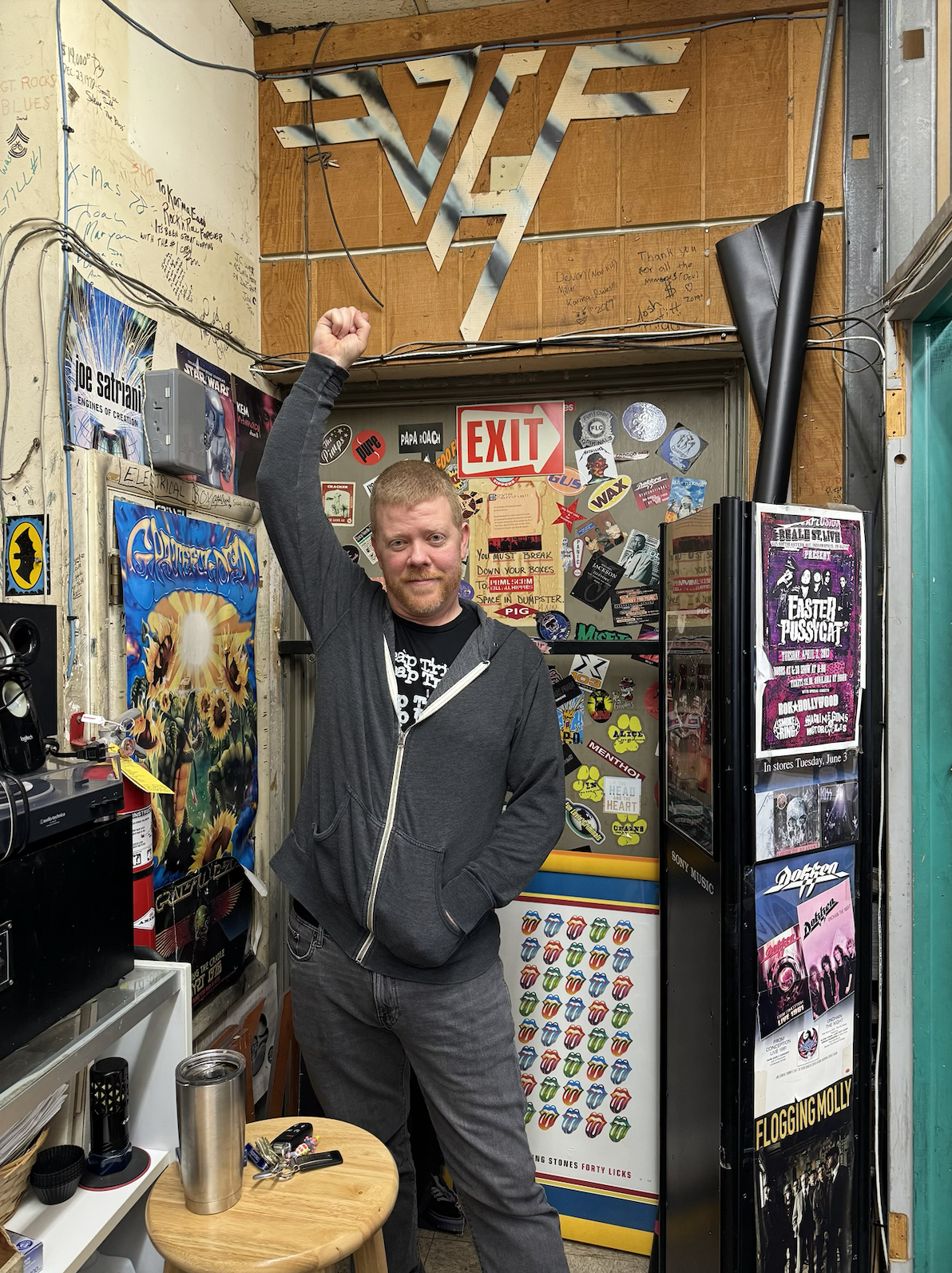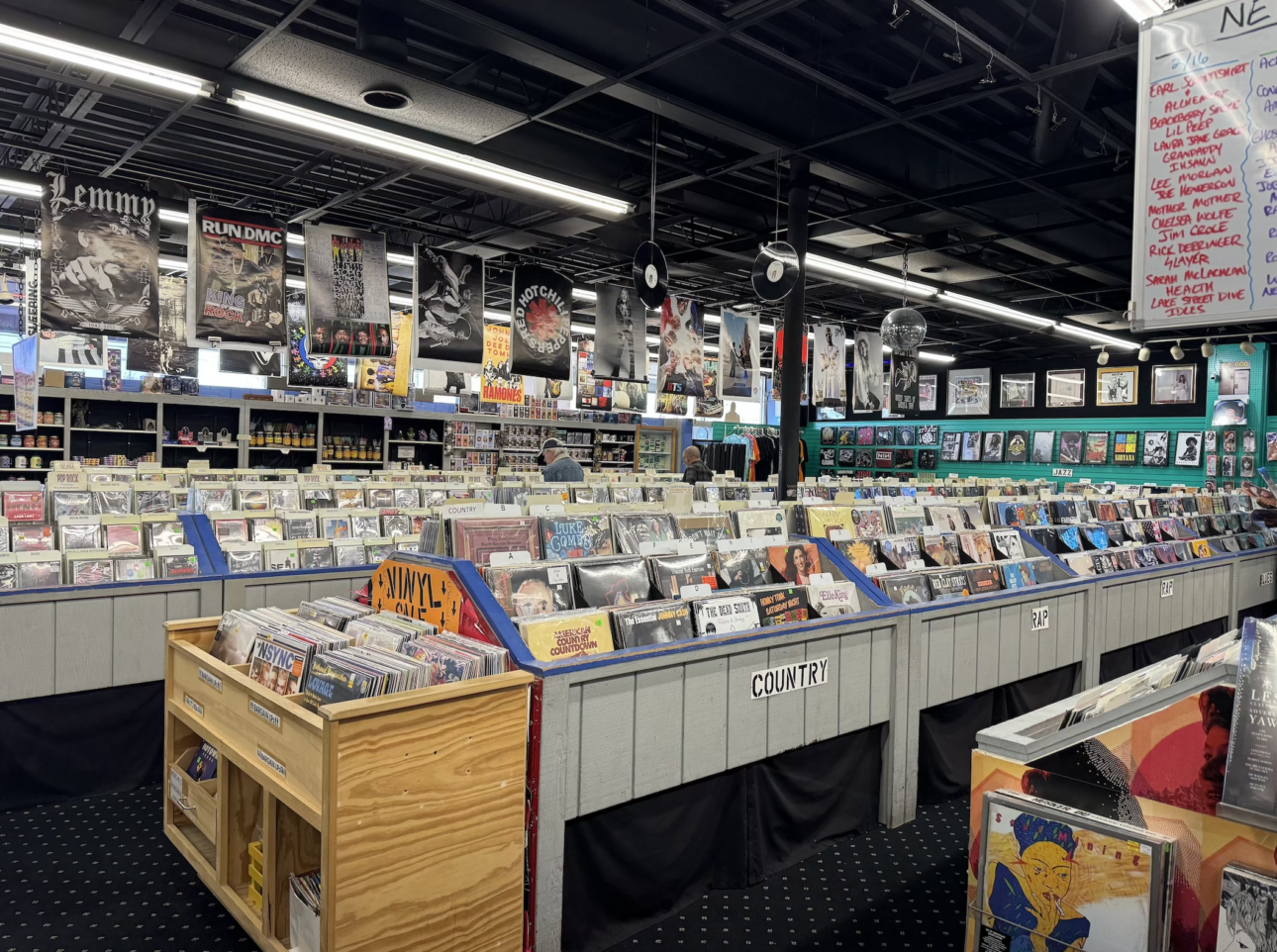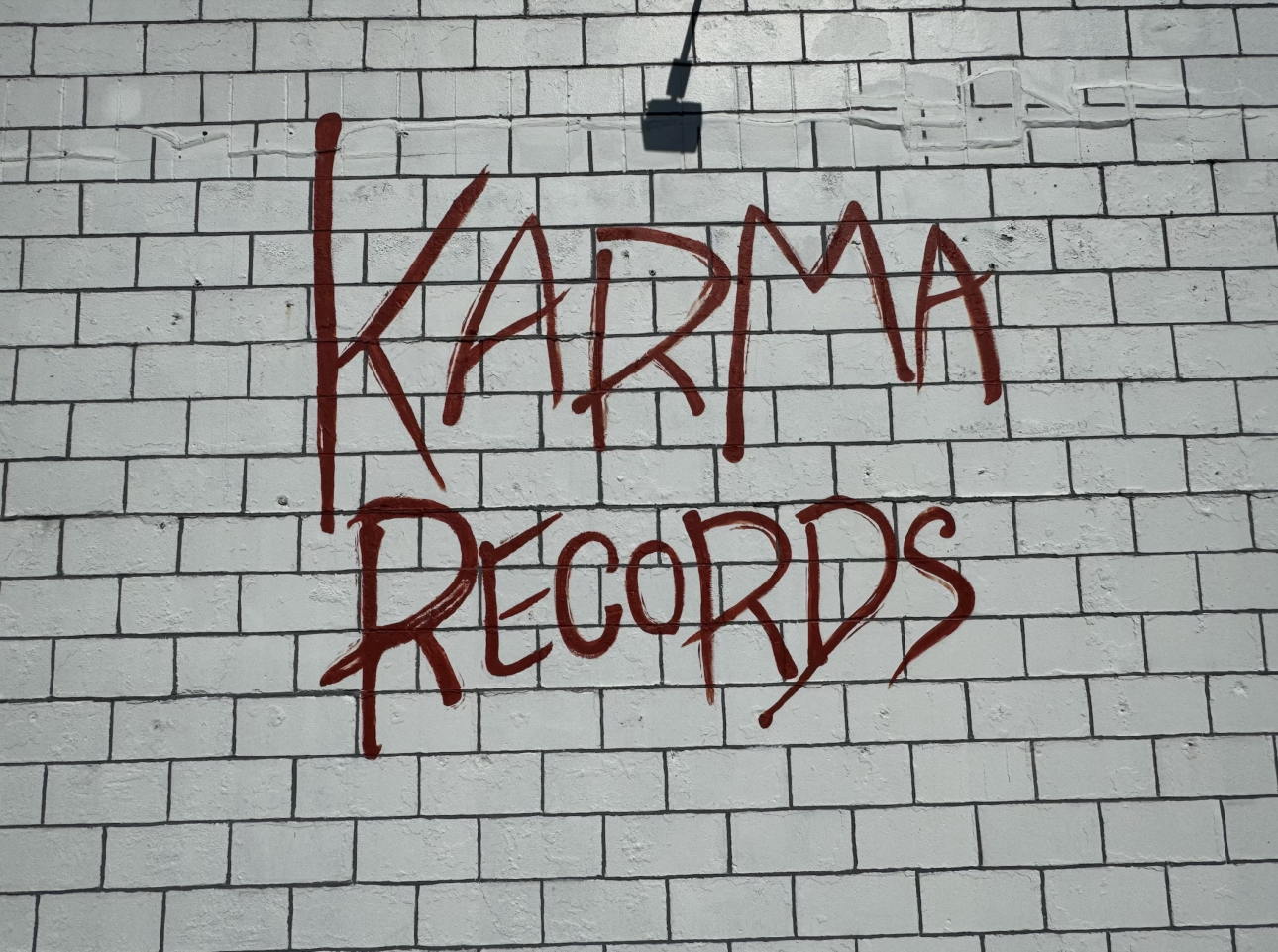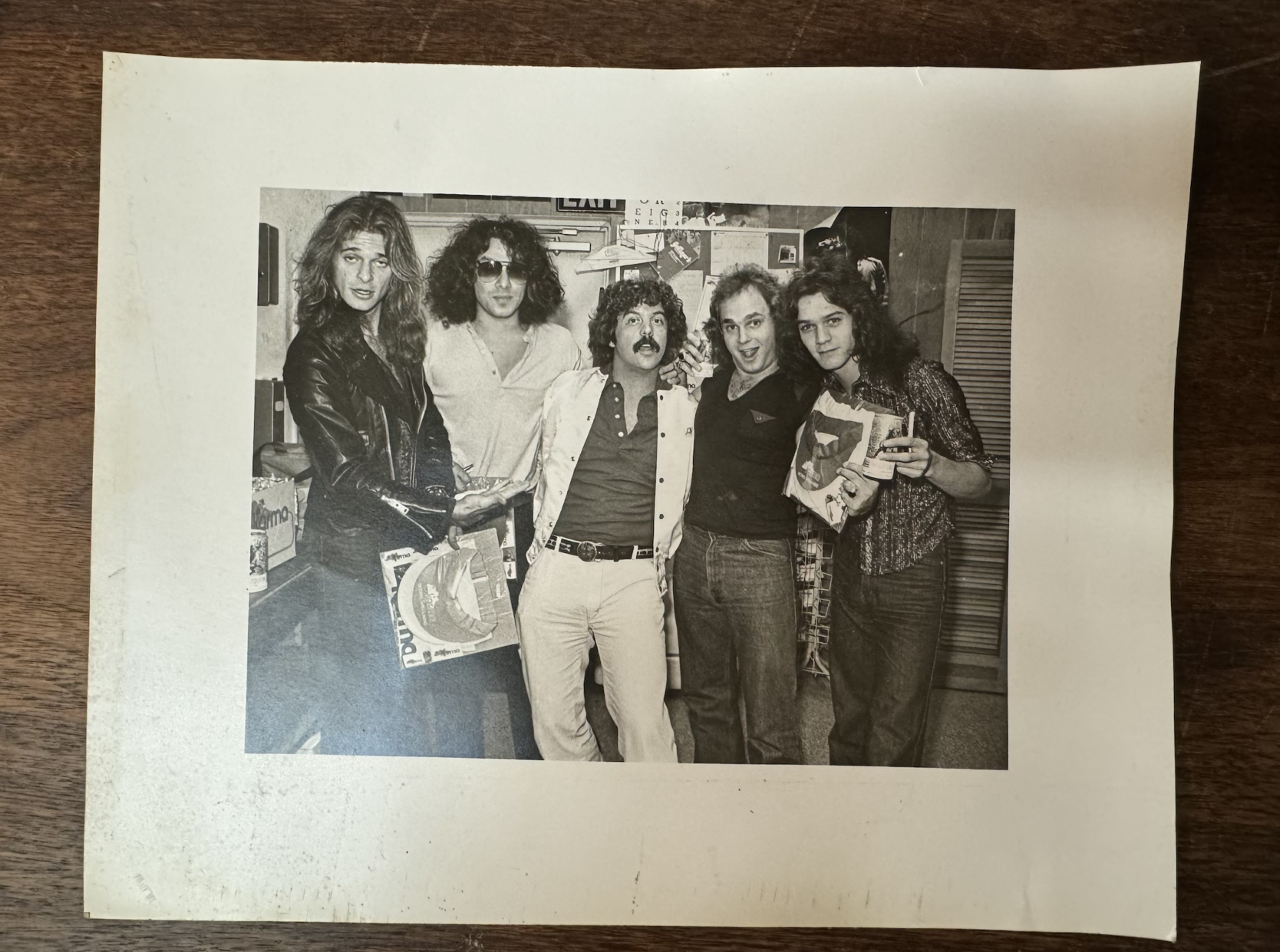“I want to show you something cool,” says James Ector, co-owner of Karma Records in Indianapolis. Wearing a dark hoodie over a Cheap Trick T-shirt, he grabs a Ziploc baggie from an old filing cabinet—covered with generations of stickers—and slides out a black-and-white photo. “A customer brought this in to us. That’s Van Halen.”
Ector points to the man in the middle, who looks like Billy Joel but is actually a local DJ popular in ‘70s and ‘80s, and he’s flanked by four guys who looked like they’ve been up all night. They’re all holding T-shirts and visors emblazoned with the Karma logo. On the far end is Indiana native David Lee Roth, looking both painfully hungover and ready for the next party.
“This would have been their first tour, when they were opening for Black Sabbath,” he says.”They stopped by Karma. That was the culture of record stores in the ‘70s and ‘80s, when you would have these big acts stopping by. Everybody has been in here: Ozzy, Megadeth, Bush, Ace Frehley. We had Twenty One Pilots before they got popular.” This photo was taken just a few feet away from where Ector is sitting this afternoon, and he points out the exit sign in the photo that’s still hanging on the wall.
The comparison shows just how much this particular location of Karma Records has changed over the years—and just how little. For one thing, the back room is much narrower, after they moved the wall back a few feet to maximize retail space. You couldn’t fit four musicians side by side now. Also, up and down the short corridor, the walls are adorned with Sharpie graffiti from clerks long gone, who established a loose tradition of signing the wall on their last day on the job. There are messages as old as 1980 and as recent as 2018.

This location of Karma Records, situated east of downtown Indianapolis since 1975, is arguably the flagship of a once-great empire. In the 1970s and ‘80s, there were more than 30 Karmas around the Midwest, mostly in Indiana but with a few in Ohio, Michigan, and Illinois. That made it the largest independent record store chain in the country. The recession and the digital revolution shuttered most of them, leaving fewer than 10 stores standing. “There were Karmas everywhere, to the point where people thought we were a national chain. But we weren’t. It was all independent. We were a big part of Indiana for a long, long time.”
Ector started working here in 1996, right at the heyday of CDs, and he and a business partner bought this Karma and two others in 2000. A music nerd ever since he first heard Sgt. Pepper’s Lonely Hearts Club Band, he has watched rock trends and technologies come and go. “We bought this place and then everybody gets high-speed internet and starts downloading everything. It wasn’t the easiest time, but people kept supporting us. That’s what got us through.”
Karma Records has remained a neighborhood institution, easily identified by its Pink Floyd mural facing East Washington Street. “We get a lot of regulars in here. We know their names, and they know ours. It’s like Cheers. There are people who’ve been shopping here since the 1970s. They remember when the place opened. They’ve had kids who shop here, and now they have grandkids who shop here. It just shows how important music is to everybody. It’s amazing to be part of that.”
Few record stores manage to hang around for more than 50 years, fewer still in the same location. With its backroom graffiti, deep LP stock (there’s an original pressing of Big Star’s Radio City behind the counter!), stickers on every surface, and original promotional posters for the Eagles and the Grateful Dead, Karma Records has the feel of a museum, which Ector says is appropriate. “That’s the thing about music—the way it can take you back. A song can instantly take you back to a specific moment in your life, more than anything else can. I think records have that kind of meaning, too.”

SPIN: How do you find your records?
Most of them come from walk-ins. Or people will contact us, and we’ll go to their house if it’s a bigger collection. It’s exciting because you never know what somebody’s going to have. We see a lot of variety in collections around here. You might have a Paul Anka or a Floyd Cramer record, but then there’ll be a Madonna or a Judas Priest in the same collection. It’s a bit of everything that comes in here. You have no idea what’s going to come through the door.
What’s the most expensive record you’ve ever sold?
We have a customer who brought in some Beatles box sets. I think they came out in ’78, with every album in the set. There was a French version, a Japanese version, a U.K. version. And none of them had been opened. Those can go for a lot of money. I think the U.S. version was about $1,500. But the stuff people really love is the stuff that’s three or four or five dollars. One of the great things about vinyl becoming so popular again is that a new generation of people are listening to stuff they never would’ve listened to otherwise. They’re probably not going to stream Kansas on their phones, but when they can buy something for a couple of bucks, they’re more likely to give it a try.
What’s the rarest?
There’s a lot of neat stuff that comes through in collections, and you never know what somebody’s going to have when they walk in. This came in the other day. [Ector pulls a record from a slot near the wall, gingerly rubber-banded between two pieces of cardboard.] Uncle Funkenstein. It’s an Indiana private-press jazz album from ’83. It’s sealed, so it’s never been played before. When it came in, I thought, Oh, that looks interesting. When I looked it up, I came across this jazz community page, and people were talking about it. They said it’s so rare that a lot of people think it doesn’t actually exist. It’s one of those kinds of records. Indiana has this incredibly weird jazz history. It’s really wild. Some of that stuff goes for crazy money. We have it listed for $3,500, but I don’t feel comfortable having it out on the floor. Accidents happen.

Who’s the most famous person who came into your store?
There was one day when I was working with Shawn, who’s been here for 25 years, and these two guys came in. Just normal guys. One of them went over to the records, and the other guy said he was looking for the Twisted Sister documentary—which is fantastic, by the way. He had a really strong accent, and he mentioned they were just in town on their way someplace else. He told me where he was from and said he’s in this band. He holds out his pass, and it’s Ghost.
Favorite album?
That’s hard, but I think The Wall is my all-time favorite album. There are a lot of other ones that are right up there, but if I had to pick one, that would be it. A lot of people now are like, you’re either a Roger Waters guy or a David Gilmour guy. I love them both, but seeing The Wall tour was amazing, where they slowly built the wall throughout the entire show.
Is that why you have the mural out front?
Back in the ‘80s they did that mural, but it got painted over. But I’ve wanted to do it again because it’s the perfect wall for The Wall. All the bricks are the right size. When they were getting ready to repaint the building again, I asked the landlords if they’d be willing to let me redo the mural. They said sure, so we got an artist to come out and do it. I love that album so much, so it’s great, but it’s very recognizable. Everybody knows The Wall.
Any advice for someone who wants to open a record store?
Well, the first thing I would say is, you just have to love music for it to be that important to you. But I’m guessing if you’re starting a record store, you do love music enough to make it your life. It’s not easy. Owning your own business is tough, and starting up a new business is even harder. It’s all about putting in the time and appreciating it and loving it. I think that’s advice for any field.





